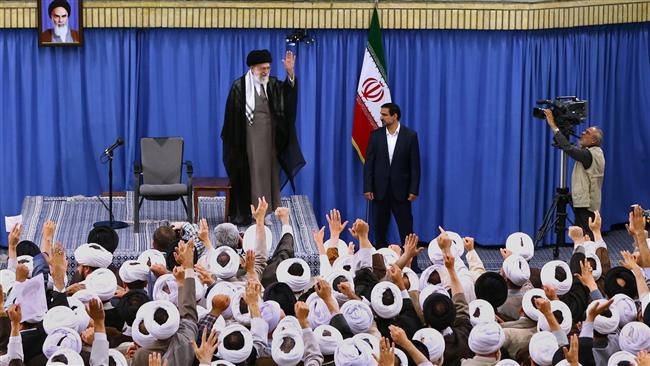
RNA – The Supreme Leader of the Islamic Revolution, Ayatollah Sayyed Ali Khamenei, received and addressed Tehran’s mosque prayer leaders on the occasion of anniversary of International Mosque Day (August 21) on Sunday about the important place of mosques in shaping social and cultural dynamism of the society,
“Mosques are the core of cultural resistance and a bedrock of social activity focused on improving public insights into the workings of the system. They are a venue for the congregation of Muslims to exchange and share opinions, planning of social movements, and mobilization of cultural resistance,” the Supreme Leader said.
“Mosques have been an important centre and a pillar of Islam’s progress during history as they provided a pillar as well for Islamic Revolution in the mobilization of the masses, along with inculcating in them the teachings of the Revolution and Islam,” he said.
Ayatollah Khamenei believed that for a general evaluation of the current issues, a grand cultural scheme should help the authorities analyze the general trend and attitudes in the masses, where mosques would provide invaluable opportunities.
“The International Mosque Day was an initiative of the Islamic Republic of Iran during an Organization of Islamic Cooperation (OIC) (formerly Organization of the Islamic Conference) meeting when the Zionist regime had been violating the sanctity of the al-Aqsa Mosque; the initiative became a focal point of winning public as well as international attentions to mosques as having huge potentials in the social life of the Muslims,” he told the meeting.
“Mosques were an institution and Islam’s solution at the nascent years of the religion, to bring the people to a congregation of worshippers; since then, mosques had been a centre of great social, political and if the situation demanded, military decisions,” Iran’s leader said.
Ayatollah Khamenei provided a brief history of the mosque, saying: “As such, a prayer imam has critical position in mosques and is pillar of the mosque, and he should not underestimate his job as acting as leading prayers, otherwise, it would be unfair about mosques and their functions in an Islamic society.”
“Imams should provide cogent responses to questions and issues brought forth by inquisitive young generation of today in a manner to attract the young people to this Islamic core,” he said.
Ayatollah Khamenei also believed that without mosques, cultural invasion would have been even stronger and succeeded in targeting the very piety of the community.
“Despite all plots, now, our young generation are far more interested in the issues than their counterparts four decades ago. This is an achievement by the Revolution which provided material for the youth on which to reflect upon their social problems; mosques provided the community with a strong shield against cultural invasion,” he emphasized.
He then turned to the imams themselves and their accurate methods of running of a mosque, saying, “Direct eye contact with people is critical to success of any attempt to teach public ideals of the religion than any other modes and media; the imam should not be merely a leader of prayers; this view is propagated by a secular body of population which is doing injustice for mosques,” the leader detested.
“A secular Islam which restricts religion in individual sphere and bans it from action in social life is no longer subject to opposition by imperialism. What they are angry about and actively fight is a strong political Islam which mobilizes the public in the road to their this and salvation in hereafter,” he concluded.
R111/112/E